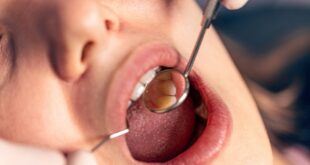
Swollen gums can be uncomfortable and may indicate an underlying dental or health issue. Here are some common causes and suggestions for managing and treating swollen gums:
Common Causes of Swollen Gums
- Gingivitis: This is the earliest stage of gum disease, caused by plaque buildup on teeth. Symptoms include red, swollen, and bleeding gums.
- Periodontitis: A more severe form of gum disease that can damage the soft tissue and bone supporting the teeth.
- Infection: Bacterial, viral, or fungal infections can cause gum swelling.
- Poor Oral Hygiene: Inadequate brushing and flossing can lead to plaque and tartar buildup, resulting in gum inflammation.
- Hormonal Changes: Pregnancy, menstruation, and menopause can cause hormonal changes that make gums more sensitive and prone to swelling.
- Nutritional Deficiencies: Lack of vitamins, particularly vitamin C (scurvy), can lead to swollen gums.
- Allergic Reactions: Reactions to dental products, food, or medications can cause gum irritation and swelling.
- Ill-fitting Dental Appliances: Dentures, braces, or retainers that don’t fit well can irritate the gums.
- Medical Conditions: Conditions like diabetes, leukemia, and certain immune disorders can cause gum swelling.
Home Care for Swollen Gums
Good Oral Hygiene:
- Brush your teeth twice a day with a soft-bristled toothbrush.
- Floss daily to remove plaque and food particles.
- Use an antimicrobial mouthwash to reduce plaque and bacteria.
Salt Water Rinse:
- Rinse your mouth with warm salt water (1 teaspoon of salt in a glass of warm water) to reduce inflammation and kill bacteria.
Hydration:
- Drink plenty of water to help keep your mouth clean and increase saliva production, which helps fight bacteria.
Avoid Irritants:
- Stay away from tobacco products and reduce your intake of sugary or acidic foods and drinks.
Cold Compress:
- Apply a cold compress to your face over the swollen gums to reduce pain and swelling.
When to See a Dentist
- Persistent gum swelling that doesn’t improve with home care.
- Gums that bleed easily.
- Severe pain or discomfort.
- Signs of infection, such as pus, fever, or a foul taste in the mouth.
- Loose teeth or changes in the way your teeth fit together when you bite.
Professional Treatment
- Dental Cleaning: A professional cleaning can remove plaque and tartar that regular brushing and flossing can’t reach.
- Scaling and Root Planing: A deep-cleaning procedure that removes plaque and tartar from below the gum line and smooths the roots of the teeth.
- Medications: Antibiotics or antimicrobial mouth rinses may be prescribed to treat infection.
- Surgery: In severe cases, procedures like flap surgery or grafts may be necessary to restore gum health.
Maintaining good oral hygiene and regular dental check-ups are key to preventing and managing swollen gums. If you have concerns or persistent symptoms, consult your dentist for a thorough evaluation and appropriate treatment.
 Daryeel Magazine
Daryeel Magazine



